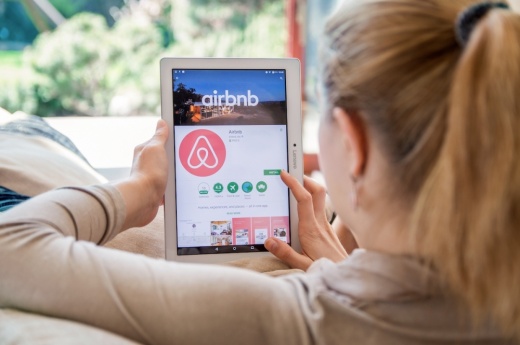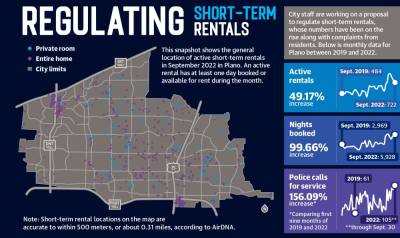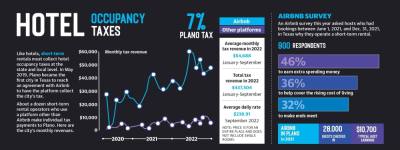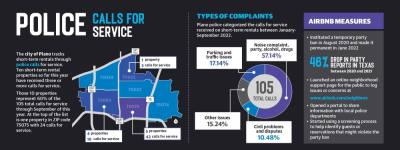For months, some residents have urged the city to ban short-term rentals, which are offered for rent for fewer than 30 days through such online platforms as Airbnb, Home Away and Vrbo. But a total ban could put Plano at risk for a legal challenge, according to an Oct. 10 presentation to City Council.
The number of short-term rentals in Plano has been increasing. Estimates from data and analytics provider AirDNA show the active number of short-term rentals in Plano in September was 722, up 49% from the same month in 2019. The number of bookings during that same time frame has nearly doubled, AirDNA data showed.
Nearly 82% of listings involved an entire place with the remainder offering a private room or shared space for rental, AirDNA estimates showed.
Part of the challenge for city officials is knowing where short-term rentals are located, as the information is constantly changing. Some operators list homes year-round while others may make their short-term rental available only on certain days of the year.
“[Short-term rentals are] something we need to address, and we’re trying to really thoughtfully do that in the best way possible and limit litigation and unnecessary waste of taxpayer dollars,” Council Member Julie Holmer said at the Oct. 10 meeting.
Plano City Council is scheduled to get its first look at a staff proposal on short-term rentals at its Nov. 14 council meeting.
“The focus of the ordinance, as it stands, is registration and inspection of operations,” Steve Stoler, director of media relations for the city of Plano, said in an email.
Tracking rentals
The Plano Police Department has been tracking calls for service related to short-term rentals since 2019.
Complaints have ranged from noise disturbances and loud parties to trash and traffic issues. More than half of the 105 police calls for service related to short-term rentals so far this year have involved the same 10 properties, which is about 1% of all listings, records show.
City staff have been discussing a registration system that would not only help to better track issues but also open up opportunities to educate owners about city codes regarding trash, parking and noise.
The city of Frisco adopted a permitting program for short-term rentals late last year. Dallas has been requiring online registration for operators since late 2019. The city of Richardson’s new registration program for short-term rentals will go into effect on Jan. 1.
While some cities adopt registration systems to ensure short-term rental operators are paying the required local hotel occupancy tax, that is not an issue in Plano.
In 2019, the city became the first in Texas to reach an agreement with Airbnb to require the platform to collect the city’s local hotel occupancy tax. Plano receives a monthly payment from Airbnb for taxes collected on all of its bookings. The city also receives individual payments from about a dozen operators on other platforms, according to staff.
So far this year, Plano has collected an average of $54,688 a month in local hotel occupancy taxes, according to data from the city.
Lori Schwarz, Plano’s director of neighborhood services, told City Council that a registration process through a third-party operator would provide local contact information for short-term rental operators and help the city understand where the problems are coming from.
It would also set up an inspection process similar to what the city already has for hotel/motel operators and multifamily property managers, Schwarz told the City Council.
“If this program is created at the direction of City Council, what we would be doing is taking that data that we’re going to be collecting over the next year and then looking at those, doing an annual analysis ... and look at any necessary modifications to the program,” she said during a presentation over the summer.
But some council members have expressed interest in doing more.
“The overall goal really needs to be to preserve our residential neighborhoods,” Council Member Rick Grady said at the Oct. 10 meeting.
What operators say
Corey Reinaker said he has welcomed travelers from around the world to the short-term rental he has operated out of his house in Plano’s Old Towne Neighborhood since 2017.
“The extra income we’ve earned has allowed us to reinvest in our property and has also provided a semi-passive cushion of income that has helped as a buffer during uncertain economic times,” he told City Council members in October.
The house next door to his is also a short-term rental, Reinaker said, where a majority of guests since 2020 have been families moving to Plano or residents who need a place to stay while their homes are renovated.
He said he was sympathetic to residents who have had trouble with neighboring short-term rental guests and hoped the city could come up with a solution.
Airbnb, one of the larger online platforms for short-term rentals, reported about 28,000 guests used its listings in Plano last year. A typical host in Plano earned about $10,700 last year, the company reported.
“The overwhelming majority of hosts on Airbnb are responsible neighbors who rely on home sharing to supplement their income amid the rising cost of living, and to welcome guests who support local small businesses,” Airbnb’s Public Policy Manager Jose Luis Briones said in a statement. “Airbnb supports reasonable regulations that address community concerns, protect property rights, and preserve the benefits short-term rentals provide to residents and the broader state economy.”
Law is in flux
Bill France has lived in Plano for about 25 years and has spoken out against short-term rentals for months during City Council meetings.
“Controlling the bad behavior of short-term rentals will never fix the fundamental problem: the revolving door of strangers,” he told council at a recent meeting. “Strangers displace long-term residents, the folks we know and count on as our friends. Strangers destroy our sense of safety, security and belonging—the very reason we moved to Plano in the first place.”
France is part of the Plano, Texas, Neighborhood Coalition, which advocates a ban on short-term rentals in single-family residential areas.
He and others have urged Plano to adopt an ordinance similar to the one in the city of Arlington, which designates certain areas of the city where short-term rentals are allowed. Arlington’s ordinance concentrates short-term rentals in an area around its entertainment district as well as in high-density residential areas, nonresidential zoning districts and in areas with mixed-use zoning, according to the city’s policies.
The city of Plano’s zoning ordinance does not allow hotels, motels, boarding houses or bed-and-breakfasts to operate in single-family residential areas. But its zoning does not specifically address short-term rentals.
City officials lined up a presentation at the Oct. 10 council meeting from attorneys Richard Abernathy and Ryan Pittman to highlight policies in some other Texas cities that have been met with legal challenges.
Abernathy told Plano City Council there are a lot of different opinions on short-term rentals, from operators who believe they are entitled to operate with little to no restriction to citizens who are demanding strict rules or even outright bans. Part of the challenge, he said, is that the law for short-term rentals is in flux.
“What we do know, though, is that the Texas courts have consistently rejected claims that STRs are commercial uses,” he said.
Abernathy also said courts have routinely stricken rules that limit the number of people allowed to stay at a short-term rental. Citywide bans of short-term rentals have also generally been held to be unenforceable, he said.
Schwarz said a key to Plano’s registration program would likely involve educating the operators about issues related to parking, trash and noise.
“Our hope is that we can start figuring out a way to make the situation better for our residents and then also figure out a way to ensure that if people are operating short-term rentals that they are meeting our current public health and safety guidelines,” she said.








